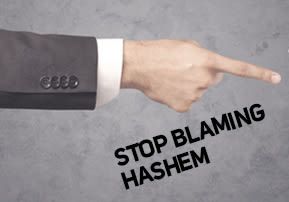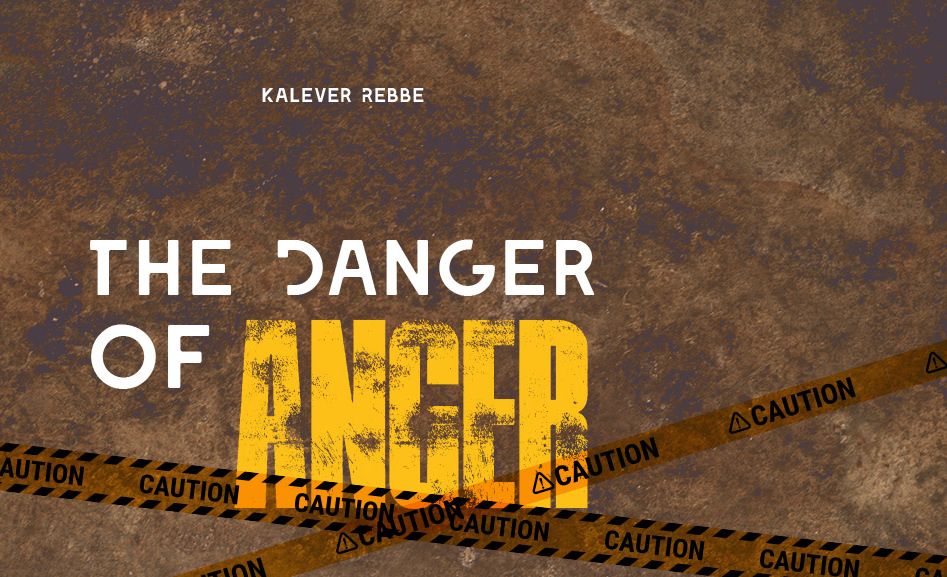
Stop Blaming Hashem
A victim mentality is something that we all suffer from at one point or another in our lives. It’s very easy to blame our spouse for our suffering...

Dear Racheli,
I have been married to my husband for over 20 years. Five years ago, he cheated on me with his secretary and she had his child. I decided to try to forgive him and continued staying married to him. He maintains a relationship with this child. Lately, though, he has been drinking a lot and acting very rude and disrespectful when he gets drunk. I don’t know why Hashem is allowing this to happen to me. Haven’t I suffered enough?
Maria
Maria,
Before I begin, I’d like to clarify something. Many people with strong religious beliefs think that they are supposed to stay married to a cheating or abusive spouse, since this is the spouse Hashem gave them. This is simply not true. When it comes to infidelity and being in danger, there is no reason for them to be martyrs.
Regarding your husband – he needs help. He’s got serious issues that he doesn’t want to deal with, and things could keep getting worse until he starts working on them. Hopefully he is open to therapy, if you haven’t already suggested it. If you have suggested it and he is not open to it, you should not feel the least bit guilty if you decide to leave him. Everyone has their tolerance threshold.
Now, I’m going to present some tough questions in order to get you to think out of the box. By no means am I accusing you of making a bad decision or attacking you. I just want you to see things from another  perspective. So let’s rephrase your question.
perspective. So let’s rephrase your question.
Instead of asking why Hashem is allowing this in your life, you should be asking: why am I allowing this in my life?
Your next questions should be: why did I agree to stay with my husband after he betrayed me? Was it for purposes of financial security? Was it because I believe in staying married, no matter what? Was it because I was unsure of my ability to be a single mother? Was it because I was afraid to be alone?
Your original question represents one of the fundamental and seemingly unanswerable questions that plague most of humanity: Why did God let this happen to me?
You see, Maria, the whole problem is the question itself. Though it seems to be a fair question on the surface, the underlying feeling of being a victim is the real problem here.
A victim mentality is something that we all suffer from at one point or another in our lives. It’s very easy to blame another person for our suffering, especially when it seems that they really were at fault, and we were completely innocent.
It’s also very easy to blame Hashem for our suffering, and this is where the root of the problem is. Actually, it’s two roots.
First, when we suffer from a victim mentality, we feel that we are not in control of a difficult situation. Actually, I think it would be fair to say that people who are in suffering from chronic victimitis feel that they are not in control of any aspect of their lives, because “It’s always someone else’s fault.”
Obviously your husband did a terrible thing by cheating on you; but you didn’t leave him. Of course it’s human to feel like a victim, since you really didn’t do anything wrong. But, what did you do to change the situation? Did you attempt to take control in any way, for example, by going for marital counseling? Or, did you just resign yourself to the reality of your situation?
Second, we believe Hashem doesn’t want what’s best for us. That is, if we even believe that Hashem exists. Maybe you think He is punishing you, or He doesn’t care about you. Maybe you think everything is random and has no rhyme or reason. Whatever your beliefs are, I can assure you of one thing: you do not believe Hashem loves you and is always doing what’s best for you.
The victim mentality makes us feel like we’re being punished for no reason. It’s a brilliant tool of the evil inclination. He makes us feel a sense of self-righteousness, as if we never did anything in our lives to warrant being punished in some way. It also blinds us to the messages that Hashem is trying to send us.
As a result, we tend to blame everyone else for our problems. And if we believe in Hashem, then we may also blame Him for our problems.
The first thing that you, I, and everyone else in the world needs to do is to take responsibility for our lives and stop blaming Hashem. In life, there are rules of cause and effect. So, too, in spirituality. Just because we can’t see the connection, it doesn’t mean it’s not there.
Our actions determine what reality Hashem will create for us in the future. Your decision to stay with your husband created the reality that you are still suffering with today. It’s not Hashem’s fault. Had you decided to leave your husband five years ago, you would be living in a completely different reality today. Not necessarily better – just different.
So, your next question is obviously: why did Hashem let me marry such a man if He only wants what’s best for me?
Now, we’re getting out of the box. Now, you can begin to figure out the messages Hashem has been trying to send you through your husband’s behavior. Here are some questions for you to think about.
How do you feel about yourself? Can you make a list of 10 awesome qualities you have? What about your husband attracted you to him in the beginning? Did part of you decide to be with him because you felt you couldn’t get better?
I’ll tell you a spiritual secret that’s not so secret. Hashem uses everyone in our lives like puppets in a play, in order to help us achieve our necessary soul corrections. Each and every person we come across is simply a messenger of Hashem. The hard work is in remembering that when they upset or hurt us.
Maria, as painful as it is, you must realize that it is not for no reason that you ended up marrying this man. The fact that you stayed with him further supports my hunch that many spouses stay with their cheating counterparts because they feel so beat down inside, that in a way, they’ve given up on believing that they deserve better.
So what is the message that Hashem has been trying to send you? Appreciate and love yourself! This is vital to your healing process. Rebbe Nachman was very familiar with human nature. He knew that our tendency is to focus on what’s wrong with us. As a remedy, he gave the best advice one could give: look for your good points!
Here are my suggestions: first, read The Garden of Emuna and The Garden of Gratitude. These two books will help you learn all about emuna, will teach you how to apply it in your life. They are absolute lifesavers.
Next, you and your husband are long overdue for marital and personal counseling. In my humble(?) opinion, there is no one better in the world than Dr. Zev Ballen. He combines his 30+ years of psychotherapy with an emuna approach, and the results are nothing short of miraculous. You can contact him at staff@breslev.co.il.
Along with the books, spend 30 minutes a day speaking with Hashem. Tell Him all about the pain that you’re going through. Ask Him to help you see clearly that everything is happening for your ultimate benefit. Ask Him to help you see what a wonderful woman you are. Ask Him for whatever you want!
If you begin working on internalizing that you are very special and loved by Hashem, you will start seeing big changes and blessings very quickly!












Tell us what you think!
Thank you for your comment!
It will be published after approval by the Editor.